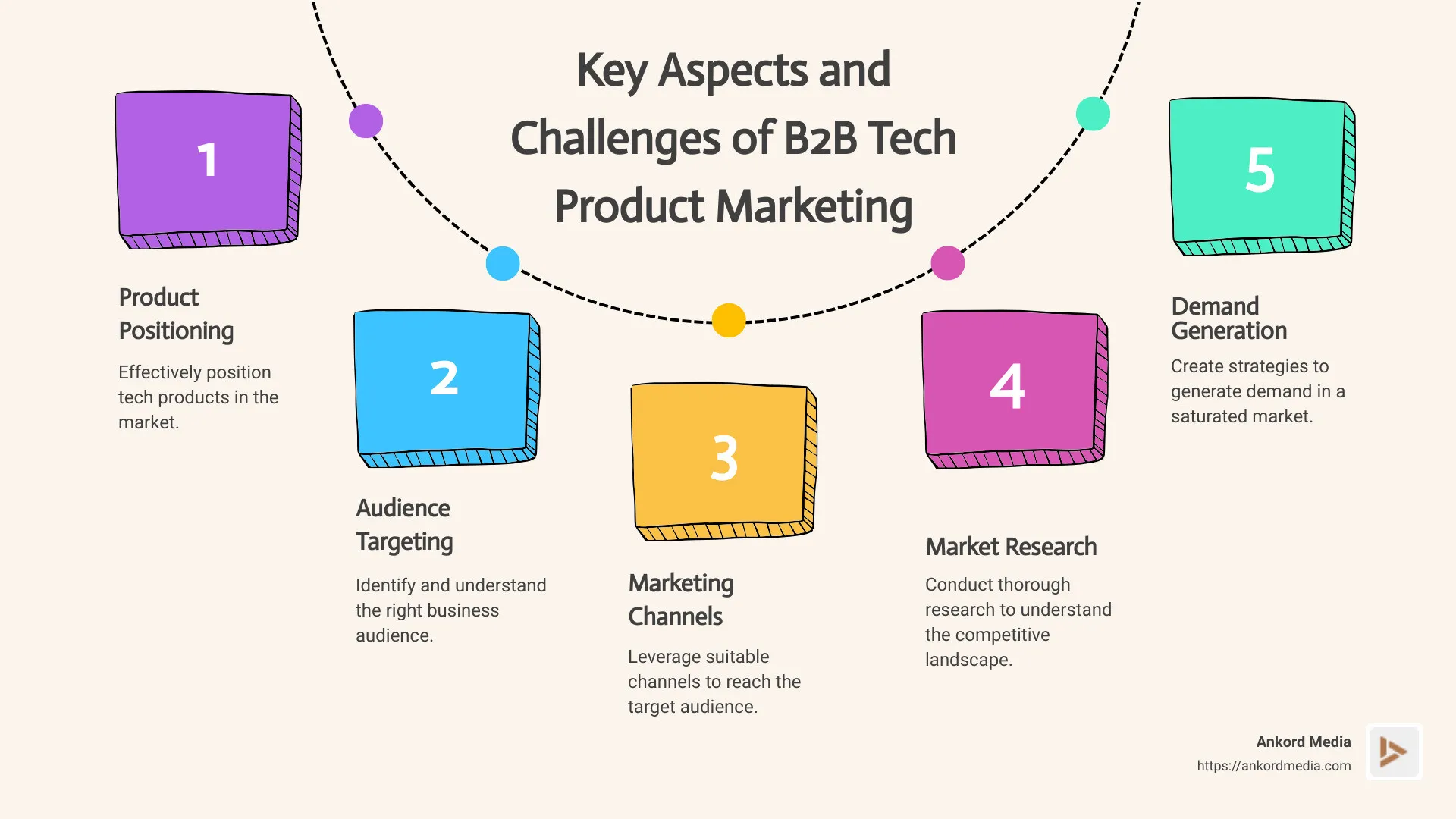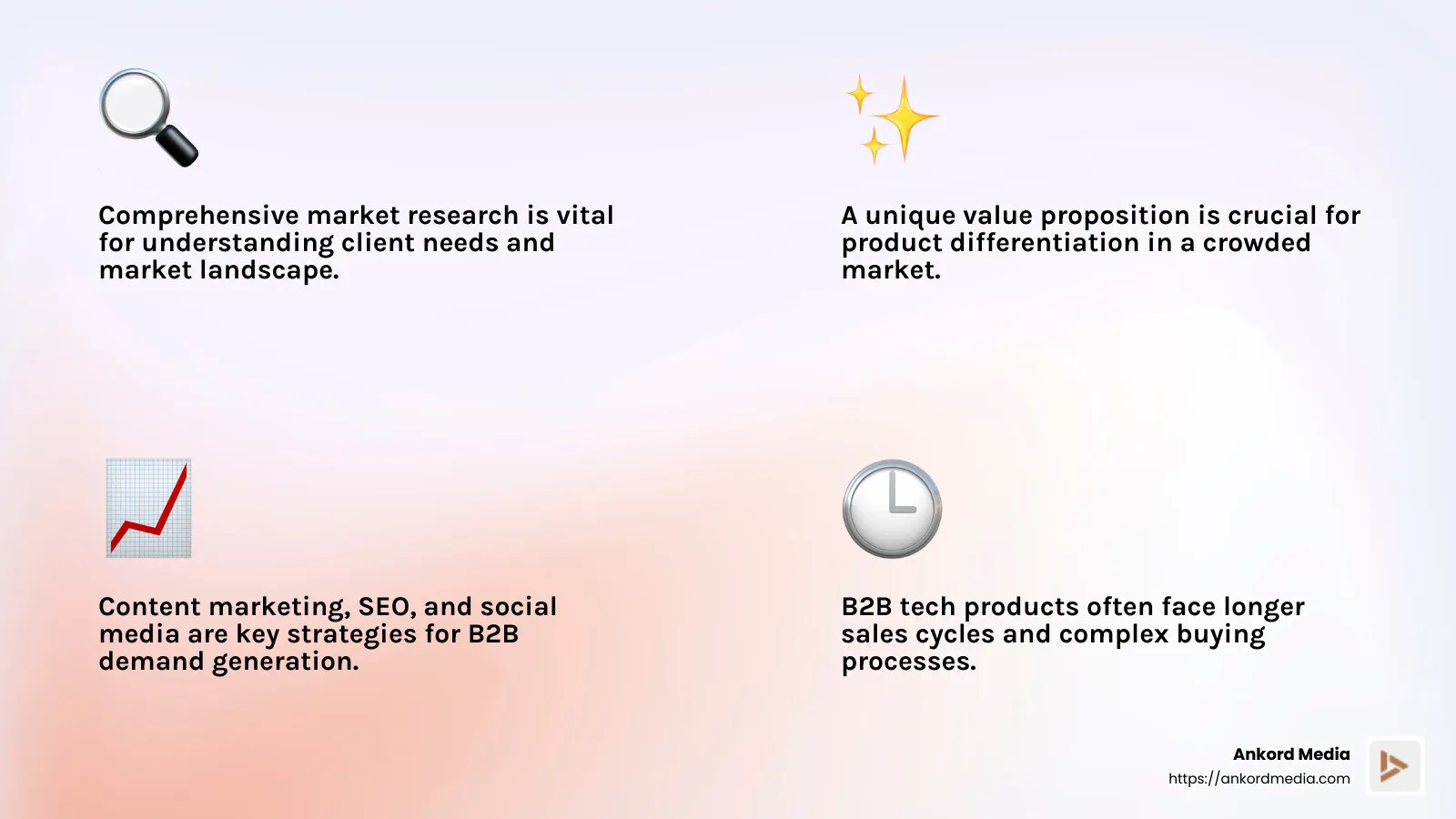From Struggle to Success: Tackling B2B Tech Product Marketing Challenges

B2B tech product marketing is the cornerstone for businesses looking to promote and sell their technology products to other businesses. This unique field focuses on understanding complex markets, crafting compelling product positioning, and generating demand in a saturated landscape.
- Core Aspects:
- Positioning products effectively.
- Understanding and targeting the right audience.
- Leveraging suitable marketing channels and strategies.
As a Gen Z entrepreneur and CEO of Ankord Media, I've seen how strategic product positioning and effective B2B tech product marketing can drive growth. My background encompasses expertise in business, technology, and design. I founded Ankord Media to help businesses define their brand identities and lift their marketing efforts.

Understanding B2B Tech Product Marketing
In B2B tech product marketing, understanding your target audience is crucial. It’s all about knowing who your customers are, what they need, and how your product can help them. This isn’t just about demographics; it’s about diving deep into their challenges, goals, and decision-making processes.
Target Audience:Knowing your audience allows you to tailor your marketing efforts effectively. In B2B tech, the buying process can be complex, with multiple stakeholders involved. According to Gartner, the biggest challenge for product marketers is building buyer confidence. Understanding your audience’s pain points and decision-making journey is key to overcoming this hurdle.
Value Proposition:A strong value proposition sets your product apart. It clearly communicates why your product is unique and how it solves specific problems for your target market. This involves highlighting unique features and capabilities and showing real-world impact. For example, using customer testimonials and case studies can make your value proposition more tangible and credible.
Marketing Channels:Choosing the right marketing channels is essential. In B2B, channels like LinkedIn, email marketing, and industry webinars are often most effective. These platforms are where decision-makers spend time and are more receptive to your message. Align your marketing channels with your audience's preferences to maximize reach and ROI.
Leveraging the right channels not only expands your reach but also improves the effectiveness of your marketing efforts. By meeting your audience where they are, you ensure that your message is heard loud and clear.
Understanding these elements—target audience, value proposition, and marketing channels—lays the foundation for successful B2B tech product marketing. This knowledge empowers you to craft strategies that resonate with your audience and drive business growth.
Key Challenges in B2B Tech Product Marketing
Navigating the field of B2B tech product marketing can be daunting, with several key challenges standing in the way of success. Let's dig into three major problems: market research, product differentiation, and demand generation.
Market Research
Understanding your market is the cornerstone of effective marketing. However, in B2B tech, this task is often complex. The target market consists of businesses with varying needs and decision-making processes. According to Gartner, helping buyers build confidence is a significant challenge for product marketers.
- Comprehensive Research: Conducting thorough market research is vital. It involves gathering insights about potential clients, their pain points, and the market landscape. This information is crucial for tailoring your marketing strategy to meet the specific needs of your audience.
Product Differentiation
In a crowded B2B tech landscape, standing out is essential. However, differentiating your product from competitors is easier said than done.
- Unique Value Proposition: Crafting a clear and compelling value proposition is key. Your product must be positioned as a unique solution to your target market's specific problems. Highlighting unique features and capabilities, along with real-world impact through customer testimonials and case studies, can improve your product's appeal.
Demand Generation
Generating demand for B2B tech products is another significant challenge due to longer sales cycles and complex buying processes.
- Lead Generation Strategies: Implementing strategies like content marketing, SEO, and social media marketing can help. These methods not only attract potential customers but also nurture them through the buying journey. As mentioned earlier, nearly half of customers view several pieces of content before contacting a sales representative.

By addressing these challenges head-on, businesses can create effective B2B tech product marketing strategies that resonate with their audience and drive demand. This sets the stage for crafting compelling messaging and content that further supports marketing success.
Strategies for Overcoming B2B Tech Product Marketing Challenges
In B2B tech product marketing, overcoming key challenges requires strategic approaches. Here are some effective strategies focusing on content marketing, SEO, and sales enablement.
Content Marketing
Content marketing is a powerhouse in B2B tech marketing. It involves creating valuable content that resonates with your target audience, building trust and credibility without direct selling.
- Educational Content: Develop content that addresses the pain points of your audience. This could be in the form of blog posts, whitepapers, or webinars. Providing insightful information positions your brand as a thought leader. Educational content is about delivering value, not just promoting your product.
- Case Studies and Testimonials: Use real-world examples to demonstrate your product's effectiveness. Case studies and testimonials offer tangible proof that your solutions work, helping potential customers envision the benefits for their business.
SEO Strategies
Search Engine Optimization (SEO) is crucial for increasing visibility and attracting potential customers to your website. A well-optimized site ensures that your content reaches the right audience.
- Keyword Research: Identify and use keywords that your target market is likely to search for. This helps in creating content that aligns with what potential customers are looking for, improving your search rankings.
- On-Page Optimization: Ensure your website's content, meta descriptions, and titles are optimized for search engines. This includes using keywords strategically and ensuring your site is mobile-friendly and fast-loading.
Sales Enablement
Sales enablement involves equipping your sales team with the tools and information they need to effectively sell your product.
- Create Sales Materials: Develop comprehensive sales materials that highlight your product’s unique value proposition. This can include brochures, presentations, and comparison sheets that clearly outline the benefits and differentiators of your product.
- Training and Support: Provide your sales team with regular training and updates on product features and market developments. This ensures they are well-prepared to address customer queries and confidently communicate your product's value.
By implementing these strategies, businesses can effectively tackle the challenges of B2B tech product marketing. This not only helps in generating demand but also ensures your product stands out in a competitive market. Next, we will explore how crafting effective messaging and content creation can further improve your marketing efforts.
Effective Messaging and Content Creation
In the field of B2B tech product marketing, crafting a compelling message is crucial. It's about conveying your product's value in a way that resonates with your audience. Let's explore the key elements: unique value proposition, educational content, and customer success stories.
Unique Value Proposition
Your unique value proposition (UVP) is what sets your product apart. It tells your audience why your solution is the best choice.
To define your UVP, focus on what makes your product different and better. Is it faster, more reliable, or cost-effective? Highlight these aspects clearly. According to BayCreative Team, articulating your UVP effectively is essential. It not only differentiates your product but also aligns with the needs of your target audience.
Educational Content
Educational content plays a pivotal role in establishing your brand as a thought leader. When you provide valuable information, you build trust and credibility.
Consider creating blog posts, webinars, and whitepapers that address the pain points of your audience. As mentioned in the research, nearly half of customers review several pieces of content before contacting a sales representative. This underscores the importance of delivering insightful and relevant information that guides potential customers through their buying journey.
Customer Success Stories
Customer success stories offer real-world proof of your product's effectiveness. They allow potential clients to see how others have benefited from your solutions.
Share narratives and case studies that highlight the success your customers have achieved. This not only demonstrates your product's value but also helps prospects envision similar outcomes for their business. As noted, case studies can be a powerful motivator in the purchase decision process, providing tangible evidence of your product's impact.

By focusing on these elements, you can craft messaging and content that truly resonates with your audience. This approach not only attracts potential customers but also nurtures existing leads, steadily guiding them through the buyer’s journey.
Next, we will address some frequently asked questions about B2B tech product marketing to further clarify this complex field.
Frequently Asked Questions about B2B Tech Product Marketing
What is B2B tech marketing?
B2B tech marketing is the process of promoting technology products or services to other businesses. Unlike B2C, where the focus is on individual consumers, B2B marketing targets decision-makers within companies. These decision-makers are looking for solutions that can improve their business operations. This type of marketing requires a deep understanding of the business needs and challenges of the target audience.
How to create an effective B2B product marketing strategy?
To create a successful B2B product marketing strategy, start by identifying your target audience. Understand their needs, challenges, and the goals they want to achieve. Next, develop key messaging that clearly communicates the value of your product. This messaging should highlight how your product solves specific problems for the audience.
A customer-centric approach is crucial. Tailor your communication to address the unique pain points and preferences of your audience. Use various communication channels like email, social media, and webinars to reach your audience effectively. Consistent and clear messaging across all channels ensures your value proposition resonates well with potential customers.
What are the 4 types of B2B marketing?
B2B marketing can be categorized into four main types:
- Business-to-Business Services: Marketing services like consulting, legal advice, or IT support to other businesses.
- Business-to-Business Products: Selling tangible products such as machinery or software to other companies.
- Business-to-Business Information: Providing data or research services that help businesses make informed decisions.
- Business-to-Business Institutional/Industrial: Targeting large-scale operations like government agencies or manufacturing plants with specialized solutions.
Each type requires a different approach, but all share a focus on understanding and meeting the specific needs of business clients.
In the next section, we will explore the concluding thoughts on how Ankord Media can help businesses steer the complexities of B2B tech product marketing through strategic branding and impactful storytelling.
Conclusion
At Ankord Media, we believe that the key to success in B2B tech product marketing lies in strategic branding and impactful storytelling. Our mission is to transform bold visions into tangible success by crafting digital experiences that resonate with your audience.
Strategic Branding is not just about logos or color schemes; it's about creating a cohesive message that aligns with your company's values and goals. At Ankord Media, we partner with visionary clients to develop a brand identity that stands out in the crowded B2B tech market. By leveraging our expertise in design and technology, we ensure that your brand communicates its unique value proposition effectively.
Impactful Storytelling is at the heart of what we do. We understand that in B2B tech, it's not just about showcasing features and benefits, but about telling a compelling story that connects with your audience on a deeper level. Our team excels at weaving narratives that highlight your product's success stories, demonstrating real-world applications and outcomes that matter to your customers.
By focusing on these elements, we help businesses steer the complexities of B2B tech product marketing with confidence. Whether it's through engaging content, innovative design, or strategic messaging, Ankord Media is here to amplify your brand's voice and drive growth.
Ready to lift your brand and accelerate your business growth? Find how Ankord Media can help. Let's turn your bold ideas into success stories.


